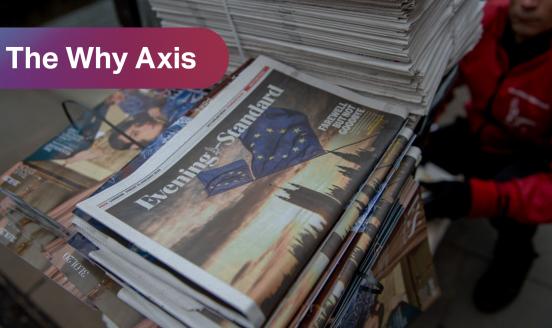Questions on financial services policy for Valdis Dombrovskis, Executive Vice-President-designate of the European Commission
Completing the banking union is the dominant task in the financial services area for the next five years. In the short term, the Commission should aff

Mr Dombrovskis’s designated portfolio as “Executive Vice-President for an economy that works for people” covers a wide array of issues, including economic and monetary affairs and trade which are covered in separate blog posts in this series, as well as jobs and cohesion policies. Nevertheless, the allocation of supporting services gives him direct and sole authority over DG FISMA (the European Commission’s Directorate-General for Financial Services, Financial Services and Capital Markets Union), and his mission letter from President-elect Ursula von der Leyen confirms that this area has a special status within his portfolio.
This post, echoing the memo on the same scope that was recently published by Bruegel, is thus focused on financial services policy. In this area, Mr Dombrovskis can hit the ground running, as he took it over from Commissioner Jonathan Hill in 2016 following the latter’s resignation.
As the memo makes clear, the reform agenda is dominated by the unfinished banking union, whose completion is highlighted by Ms von der Leyen both in her political guidelines and in Mr Dombrovskis’s mission letter. Mr Dombrovskis should not aim at upgrading the current halfway house of banking union to an incrementally better halfway house, but at genuinely finishing the job – i.e. breaking the notorious vicious circle between banks and sovereigns, which in 2011-2012 has been correctly identified by policymakers as the true engine of the euro crisis. This is a difficult task that will require a lot of dedication: if it is not granted clear priority, it will fail. Fortunately, it is far from impossible: completing the banking union (which means not eliminating all structural differences among member states in terms of banking services, but only decorrelating banking credit from sovereign credit) can be achieving without treaty change, and without any major steps towards fiscal union.
In comparison, the “capital markets union” (CMU) is a valuable vision, but should not be a diversion from the main task of banking union. A true CMU can only be viewed as a very long-term project, and cannot really start as long as banking union remains unfinished.
An exception to this order of priorities, however, could and should be made for the fight against money laundering, given the issue’s recent salience and its resonance with Ms von der Leyen’s ambition of a “geopolitical Commission”. This makes a strong case for an early initiative. Thus the following questions.
1. Will you create a credible EU Anti-Money Laundering (AML) supervisory capability?
The current AML supervisory system in the EU is failing for structural reasons, as the Commission’s own analysis has compellingly established. The time is not for another incremental attempt at tweaking the existing system, as was done a year ago, but at a structural solution. The priority is the architecture for AML supervision, namely making sure that banks and other obliged entities have the right systems in place and operate them properly. The creation of a European AML Supervisory Authority is the simplest and most compelling answer to this challenge and should be undertaken without delay.
2. What is your strategy to complete the banking union?
Even as the Juncker Commission has not achieved major legislative steps towards a more complete banking union, there has been progress in the past five years. The initial banking union package of Single Supervisory Mechanism (SSM) and Single Resolution Mechanism (SRM) has entered into force, with early successes and failures that help to better identify the missing bits. There has also been a lot of debate that has brought further analytical clarity. The agenda can thus be distilled around three sub-questions.
2.1 How will you address the challenge of concentrated sovereign exposures?
The home bias in banks’ sovereign exposures is a well-known problem, but in recent years there has been a reluctance to tackle it head-on as the euro-area-specific challenge it is. If “domestic” banks can still be persuaded by governments to grant them preferential credit, there can be no political consensus on further euro-area-wide risk-sharing. To lift this roadblock, the Commission may consider the introduction of sovereign concentration charges. By specifically targeting sovereign concentration risk, these address the bank-sovereign vicious circle while avoiding the difficulties associated with an explicit regulatory recognition of sovereign credit risk, an issue that unlike the home bias is not specific to the euro area.
2.2 How will you build a credible European-level safety net, so that national public guarantees on banks can be effectively dismantled?
One lesson of the Great Financial Crisis is the necessity of a public safety net for the banking system. This should be kept to the minimum necessary, and set the right incentives. For the banking union to be completed, it needs to exist at the European (essentially, euro-area) level. That entails a genuine European Deposit Insurance Scheme – i.e. one that does not in any way make the insurance of deposits up to €100,000 conditional on national decisions – but also instruments to manage systemic crises, such as liquidity guarantees for sound banks. Correspondingly, the regime for non-viable banks, which includes the resolution framework but also national bank insolvency proceedings and the state aid control regime, must be reformed holistically to become more consistent and predictable.
2.3 How does the reformed framework remove the current disincentives against cross-border banking integration?
The persistence of a national mandate for deposit insurance and bank crisis management is the key reason why banks are prevented by regulators from adopting a seamless banking-union-wide management of their capital and liquidity.
3. Will you reform the governance and funding of ESMA?
The European Securities and Markets Authority (ESMA) is positioned to become the catalyst of CMU, but it was not initially designed to be a credible supervisor of financial markets and entities such as financial infrastructures, a role it is playing increasingly and should play even more in the future. Building on the experiences of the SSM and SRM, its governance and funding must be comprehensively reformed so that it becomes a genuine independent agency to oversee Europe’s capital markets. By contrast, reforms of the sister agencies EBA (European Banking Authority) and EIOPA (European Insurance and Occupational Pensions Authority) are less urgent.
4. Will you honour the EU’s commitments to global financial standards?
In line with the vision of the “geopolitical commission”, the EU should bolster its leadership as the “guardian of multilateralism”, again quoting from Ms von der Leyen. It should fully adopt the Basel accord on banking regulation, including its latest developments, and phase out the remaining “carve-outs” from its adoption of International Financial Reporting Standards. It should also streamline its representation in international bodies such as the Financial Stability Board and the Basel Committee, reflecting the institutional changes generated by the pooling of bank supervisory policymaking within the SSM.



